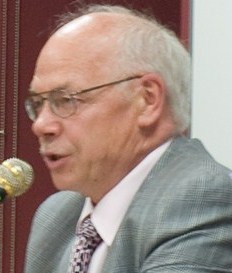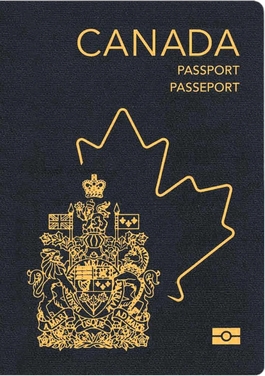
The minister of immigration, refugees and citizenship is a minister of the Crown in the Canadian Cabinet. The minister is responsible for Immigration, Refugees and Citizenship Canada, which is the federal department responsible for immigration, refugee and citizenship issues in Canada.

The minister of Canadian heritage is the minister of the Crown who heads Canadian Heritage, the department of the Government of Canada responsible for culture, media, sports, and the arts.

Andrew Peter Telegdi, PC was a Canadian politician. He was a Liberal Member of Parliament in the House of Commons of Canada from 1993 to 2008, representing Waterloo and the successor riding of Kitchener—Waterloo.
Immigration, Refugees and Citizenship Canada is the department of the Government of Canada with responsibility for matters dealing with immigration to Canada, refugees, and Canadian citizenship. The department was established in 1994 following a reorganization.

The Canada Border Services Agency is a federal law enforcement agency that is responsible for border control, immigration enforcement, and customs services in Canada.
The Department of Canadian Heritage, or simply Canadian Heritage, is the department of the Government of Canada that has roles and responsibilities related to initiatives that promote and support "Canadian identity and values, cultural development, and heritage."

The Immigration and Refugee Board of Canada, established in 1989 by an Act of Parliament, is an independent administrative tribunal that is responsible for making decisions on immigration and refugee matters. As one of their responsibilities, the IRB decides on applications for refugee protection made by individuals. The IRB reports to Parliament through the Minister of Immigration, Refugees and Citizenship (IRCC), but remains independent from both the IRCC and the Minister.

The Canadian Multiculturalism Act is a law of Canada, passed in 1988, that aims to preserve and enhance cultural diversity, i.e. multiculturalism, in Canada.

The Immigration and Refugee Protection Act (IRPA) is an Act of the Parliament of Canada, administered by Immigration, Refugees and Citizenship Canada (IRCC) and Canada Border Services Agency (CBSA), that replaced the Immigration Act, 1976 in 2002 as the primary federal legislation regulating immigration to Canada. The "Immigration and Refugee Protection Regulations" (IRPR) specify how provisions of IRPA are to be applied.

A Canadian passport is the passport issued to citizens of Canada. It enables the bearer to enter or re-enter Canada freely; travel to and from other countries in accordance with visa requirements; facilitates the process of securing assistance from Canadian consular officials abroad, if necessary; and requests protection for the bearer while abroad.

According to the 2021 Canadian census, immigrants in Canada number 8.3 million persons and make up approximately 23 percent of Canada's total population. This represents the eighth-largest immigrant population in the world, while the proportion represents one of the highest ratios for industrialized Western countries.

Canadian immigration and refugee law concerns the area of law related to the admission of foreign nationals into Canada, their rights and responsibilities once admitted, and the conditions of their removal. The primary law on these matters is in the Immigration and Refugee Protection Act, whose goals include economic growth, family reunification, and compliance with humanitarian treaties.

The Citizenship Commission is an administrative tribunal within Immigration, Refugees and Citizenship Canada (IRCC).

Multiculturalism in Canada was officially adopted by the government during the 1970s and 1980s. The Canadian federal government has been described as the instigator of multiculturalism as an ideology because of its public emphasis on the social importance of immigration. The 1960s Royal Commission on Bilingualism and Biculturalism is often referred to as the origin of modern political awareness of multiculturalism, resulting in Canada being one of the most multicultural nations in the world. The official state policy of multiculturalism is often cited as one of Canada's significant accomplishments, and a key distinguishing element of Canadian identity and Canadian values.
Barbara Louise Jackman is a Canadian lawyer specializing in immigration and refugee law, with particular emphasis on cases involving domestic violence and international human rights issues, torture and other cruel or unusual punishment, allegations of membership in and/or support of terrorist organizations, the rights and protections afforded by the Canadian Charter of Rights and Freedoms, and Canada's responsibilities under international treaties. She has been described as being one of Canada's most effective advocates for immigration and refugee rights.
Manitoba Sport, Culture, Heritage and Tourism is the department of the Government of Manitoba responsible for managing government programs and services that support the sport, art, culture, and heritage of the province, through developing, supporting, promoting, and celebrating the identity and well-being of Manitoba and its communities.
The Standing Committee on Canadian Heritage (CHPC) is a standing committee of the House of Commons of Canada. The Committee is currently chaired by Scott Simms, with Vice-Chairs Alain Rayes and Martin Champoux.

The College of Immigration and Citizenship Consultants is the Canada-wide regulatory authority created to protect consumers by overseeing regulated immigration and citizenship consultants and international student advisors.
Bellissimo Law Group PC is a Canadian law firm based in Toronto, Ontario. The firm specializes in citizenship, immigration, and refugee protection law. Its founder is Mario D. Bellissimo, an immigration lawyer and an author of multiple legal publications.






